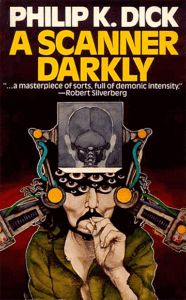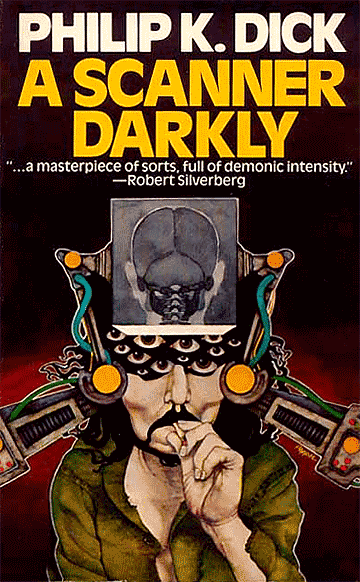
Author: Philip K. Dick
Publication Year: 1977
Length: 219 pages
My mind hurts a little bit after reading this book. I suppose that’s Philip K. Dick’s intention when he writes these bizarre mind-bending tales. In this case, though, the narrative is less mind-bending than convoluted. I understand he was trying to go for an allegory or something, but it ends up just being more of a “what the fuck is going on” kind of reaction–at least from my perspective.
The story, like most of Dick’s stories, is a cautionary tale, although this one, more than any other, is semi autobiographical, and clearly close to Dick’s heart. The story is basically a tale of drug addiction. It’s no secret that Dick battled his drug demons, and was permanently scarred by them. He, and what seems like a large group of his friends, were deep in it. These weren’t pot-smokers who occasionally dropped some acid or popped a pill. These were some hard-core junkies. Dick even lists the friends of his that have either died or been turned into lunatics or vegetables because of drugs. His name is also included on the list.
In this case, the drug of choice isn’t coke or heroine, but a non-existent opiate called “Substance D,” the “D” standing for Death. There’s not a whole lot of subtlety there. Written in 1977, and set in the future (a future that for us has already past) of 1994, things seem all sorts of warped in Dick’s future world. The future is only indicated by a few instances of “futuristic” do-dads, but all indications are that nothing has changed since the 1970s. People still talk like it’s 1976, listen to the same music, drive the same cars and have all the same misconceptions about everything that they had back during the Carter administration. Again, this seems almost like a conscientious decision by Dick to kind of arrest time, giving hints of a twenty-year advance, but keeping the world familiar to those reading about this drug culture 20 years into the future.
Substance D is apparently some bad shit. It has a tendency in heavy users to essentially cleave the two hemispheres of the brain. Its origin is highly speculative and remains a mystery and is the sole impetus for the narcotics force for which the protagonist works. Our protagonist, Bob Arctor / Fred, is a cop living in what is essentially a drug den with some other burnouts. His job is to infiltrate the Substance D pipeline and chase its production to the top of the chain. As part of his undercover persona he actually ends up doing a whole lot of Substance D. The guy has to stay in character, right? It seems, though, that he is actually more addicted to the stuff than his idiot roommates. Granted, the guys will pretty much do any drug that’s put in front of them. They all seem to have little or no means of support, and just mill around all day getting paranoid and trying to score. Included in the periphery of this group is the femme fatale, Donna, with whom Bob has a plutonic relationship that he wished beyond wish was more than that. She smokes a lot of hash and deals when she needs to.
Where things start getting into the world of Dick is in Bob/Fred’s assignment to the house, and the way his undercover apparatus works. When reporting his findings at police headquarters, he wears a “scramble suit” which projects him as a mere blur and hides his identity even from his commanding officers. In order to be a reliable officer, he must maintain complete anonymity, even from his own co-workers. Things start getting weird when, as part of his investigation (as officer Fred), his headquarters decides to install cameras in the house in which he lives in order to keep tabs on Bob Arctor (who is actually him). It’s his job to check the tapes every night to see if anything incriminating is mentioned that will help him (Fred) bust Bob (himself) and hopefully dismantle the Substance D ring. He, of course, knows he doesn’t know anything, so he goes along with it and sits there every night watching himself walk around the house, as well as watching his roommates talk about him, do awful things to each other, etc.
The problems kick into high gear when his Substance D addiction starts affecting his brain, splitting the lobes, and thus breaking his personality in two. After a while we realize reality is starting to slip away from him, as he (Fred) watches himself as Bob Arctor walking around his house on the videos and starts to recognize Bob as a separate person. The divide grows until he cannot discern between himself and, well, himself. Mind bending, right?
This is also where the allegory comes in. Drugs make you into a different person–a person you don’t even recognize. If you were to watch yourself high on smack wandering around, you would think, “What is that guy up to? That dude is completely screwed up.” That is basically the experience Fred goes through as he begins to suspect that Bob is indeed up to something, and may be the bad guy the cops think he is–which of course he’s not. Bob/Fred eventually spirals the drain with some help from his paranoid roommate, as well as the woman he wishes were his woman, who seems at once to be a help and a hindrance to his obvious problems.
Ultimately the drug and its effects get him booted from active duty, and it’s decided by his now friend Donna that he should seek treatment, though his doctors feel the damage is done, and he will never fully recover–or most likely survive withdrawal. He is brought to a treatment facility called New-Path (one of a few different government subsidized treatment facilities), is given a new identity and is broken of his spirit and individuality. Withdrawal goes poorly, and his health deteriorates to the point he is shipped out to a work farm to live out his days as a zombie.
Uplifting, right? Well, it wouldn’t be a Philip K. Dick book if there weren’t some kind of twist. And, if you’ve ever read any other Dick, you’ll recall this guy loves the conspiracy theory approach that the big guy is always the bad guy, and that irony is the best medicine. Granted, there was so much confusion and posturing and biblical philosophizing going on in the last quarter of this book, I wasn’t even sure what I was reading when I read it. I thought I got it, but at that point I just wasn’t that interested in anything but finishing the book. I’m sure it’s hard to write about something so personal (to Dick) and still make it stick to a plot you’ve constructed out of spit and notebook paper. It seems Dick started out with the idea that drugs fuck you up and make you somebody you’re not, and just kind of tried to write something around that concept, but filled the holes with rants that he must have picked up at a new age twelve step program somewhere. I don’t know, it was just too much for me. Consider my mind bent, but not broken.


